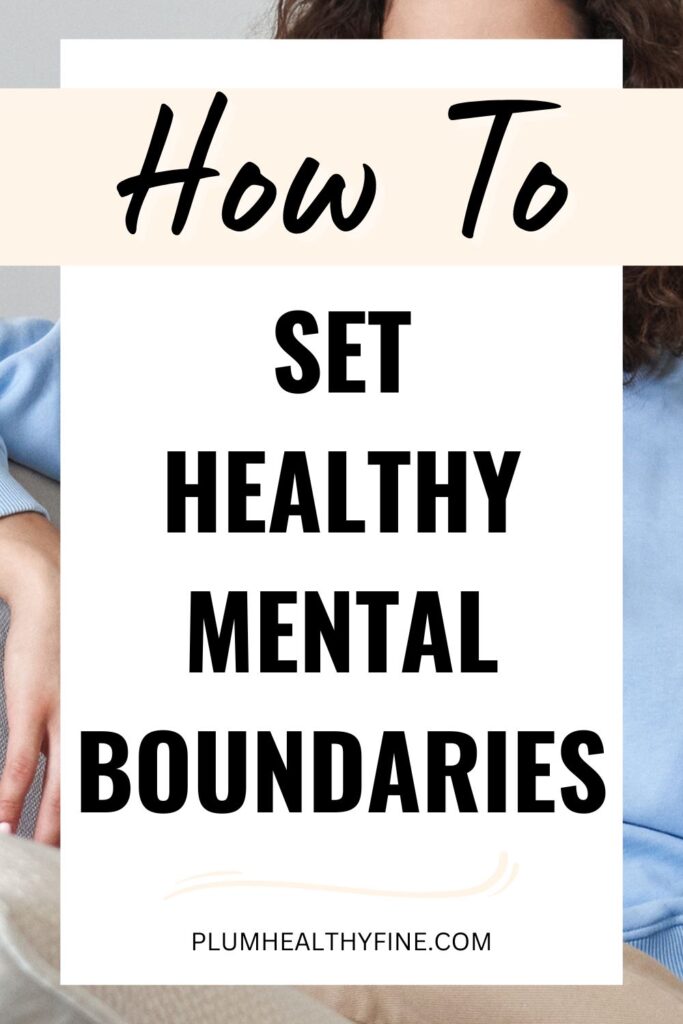This post will tell you all about setting healthy boundaries with others to preserve your well-being and nurture meaningful relationships in life.

I’ve been hearing about the concept of ‘setting boundaries’ for ages.
From self-help books to wellness blogs, it’s something people talk about a lot, and for good reason.
For one, it protects your emotional and mental well-being by stopping you from being vulnerable to the wrong person.
Secondly, it makes your relationships healthier by making you selective about what parts of you to share with whom.
And most importantly, it makes you respect yourself by reinforcing your right to prioritize yourself.
People who have healthy boundaries with others are at peace with their thoughts. They aren’t necessarily in ‘protection mode’ against the world.
Rather, they have the superpower to be able to stand still in their personal space, knowing when and who to let someone in.
Sounds quite an ability to have, right?
But here’s the thing — Even after the growing need to create personal boundaries, it can be tricky to actually understand the dos and don’ts of this process.
Do it the right way, and your boundaries will be of tremendous help in nurturing your social, professional, and personal life.
But do it wrong, and you run the risk of becoming elusive or opening too soon.

In this blog post, we’ll explore 10 practical strategies to help you set and maintain healthy mental boundaries,
If you’re looking for ways to safeguard your personal space without jeopardizing your social relations, then read on.
10 Ways To Create Healthy Boundaries
1. Recognize Your Limits
Even the most resilient people have their limits, and so do you. It’s not possible to be tough all the time or to bear everything that comes your way.
Having limits makes you human, and acknowledging them is the first step toward setting boundaries that protect your mental health.
Understand your emotional capacity and take note of situations where you feel overwhelmed or drained.
You might not have the option to avoid such instances at all times (though in most cases, you might), but you can come up with an action plan to keep your energy protected.
For me, hanging out with a big crowd for a long time can be exhausting, so I keep my mind protected by seeking mindful breaks in between, even if it’s for 10 minutes.
You do what you gotta do to draw those boundaries and keep them in sight.
2. Know Your Values and Priorities
When you recognize a person who believes in a certain value that you follow, you might want to open up to them on a deeper level.
On the other hand, while talking to someone who’s working for completely different things in life, you might want to hold back on sharing too much, knowing your thoughts might not be appreciated here.
This is a perfect example of setting boundaries, and it’s only possible when you know your values and priorities.
What are the aspects of life that are important to you? Can you think of the top five?
Be honest in your reflection.
Don’t give answers that you think would be respected by people, but the ones that make you happy and are a true reflection of your inner self.
Here are the top five values that I believe in:
- Progress isn’t linear; all you can do is aim for consistency.
- Nature is God.
- Being happy alone is an art everyone needs to master.
- You don’t have to do anything that you don’t want to.
- Beauty comes in every color, shape, and form.

3. Communicate Assertively
Effective communication is key when setting boundaries.
Be direct and assertive when expressing your needs and limits to others.
Use “I” statements to communicate how you feel and what you need, rather than placing blame or making accusations.
For example, instead of saying, “You always make me late,” you could say, “I feel stressed when I’m rushed, so I need us to leave on time.”
Some people might still find you rude, but if you ask me, maintaining your peace is better than compromising your values to make others happy.
Similar: 11 Powerful Habits To Become Mentally Strong And Fearless
4. Respect Others’ Boundaries
Just as you expect others to respect your boundaries, it’s important to respect theirs as well.
Avoid pushing others beyond their boundaries or pressuring them to do things they’re not comfortable with.
Pay attention to cues and signals that indicate when someone is uncomfortable or has set a limit. Be caring, but don’t be nosey.
When you respect others’ need for privacy, they feel more comfortable with you and find it easier to open up to you later on.
But sometimes, a person might just not be able to connect with you, and that is completely fine.
Everyone has a right to keep their boundaries, and you should always be okay with that.

5. Be Consistent
Once you’ve set a boundary, stick to it. Don’t waiver or allow others to manipulate you into changing your limits.
For example, you might decide not to hang out with your coworkers on the weekend, knowing it’s the time you want to give to your family and yourself.
Once you’ve established this boundary between your work life and personal life, stick to it.
Consistency will help reinforce your boundaries and show others that you’re serious about them.
It’s also a great way to practice laying down boundaries and sticking to what you believe in.
Recommended post: 11 Achievable Ways To Get Your Life Together Starting Now
6. Learn To Say No
Saying no can be difficult, especially if you’re used to saying yes to please others.
But if you’re saying yes to every request that pops your way, you’re inviting stress and discontentment into your life.
It’s okay to decline invitations to events that don’t align with your priorities or don’t bring you joy.
Say no firmly but politely, and don’t feel the need to justify or apologize for your decision.
This is a healthy and necessary part of setting boundaries, one that everyone should know how to pull off the right way.

(Bonus points if you can make your face like this while saying no.)
7. Lay Down Boundaries With Technology
While talking about creating boundaries, people take into account their physical world but forget all about the virtual world.
Your mental health is as likely to be affected by excess usage of technology as it is by the people around you. That’s why it’s important to set boundaries with technology.
Limit your screen time, designate tech-free zones in your house (like your bed), and resist the urge to constantly check emails or social media notifications.
Don’t reveal any personal information on social media to anyone you don’t know, avoid indulging in hour-long chats, and most importantly, say no to mindless scrolling.
Bookmark now: How To Do A Digital Detox: 8 Steps For A Screen-Free Time
8. Make Plans With Yourself
To establish healthy boundaries with the world, you first need to create a beautiful relationship with yourself.
This is because the act of setting boundaries can be a lonely process.
It is only by having a good bond with yourself that you can motivate yourself to protect your peace.
Give yourself reasons to say no to meaningless events and people by spending more time with yourself.
Just like you make plans with your loved ones, schedule your me-time too.
Travel alone, visit a cafe on the weekend, have a lovely spa self-care day at home, and make time for hobbies to make your solo time lovely and engaging.
A person who can spend time alone and be happy won’t ever find the need to please others or seek external validation.

9. Surround Yourself With Supportive People
In the name of setting boundaries, it’s easy to isolate yourself and become reclusive.
You might do this after facing rejection from some people regarding your need to have boundaries.
But don’t let the disregard from a few (or even a lot) of people faze you from wanting to have a social life.
Instead of seeking validation from the wrong crowd, cultivate relationships with people who honor your needs and encourage your self-care efforts.
The people who respect your time, values, and boundaries, are the ones who are worthy of being prioritized.
Keep pouring into such friendships and always cherish their presence in your life.
Related post: How To Be More Secure In Yourself – 10 Ways To Fight Insecurities
10. Regularly Assess Your Boundaries
You are going to grow with time, and your need for boundaries will evolve with you.
It’s important to continuously reflect on your social life and see whether you need new boundaries or need to get rid of any old ones that are no longer serving you positively.
Take time to reflect on your boundaries regularly and assess whether they are effectively supporting your needs.
I like to do this by writing down short resolutions in my journal like:
- Need to be more assertive at work.
- Say yes to more outings.
- Don’t hang out with ‘X’ person too much.
It’s a simple ritual that hardly takes 10 minutes but is super helpful in reaffirming your boundaries and your need for them.

It’s Time To Create Your Own Boundaries
Setting healthy boundaries is the ultimate way to close the door to overwhelm and stress in life.
It will empower you to be your authentic self and stick to what you believe in.
Keep in mind that setting boundaries is a continuous practice. You’ll learn the more you do it and get better at it with time.
In the end, though, the work will be worth it and will simplify your social and personal life to a great extent.
Read next: 15 Tiny Ways To Improve Your Mood When You’re Feeling Down
You just discovered 10 ways to set healthy boundaries. Quite a heavy topic, eh? But I’m sure you have something you’d like to add.
Leave your thoughts and suggestions in the comment box, please. It’s always good to hear from you.




Leave a Reply